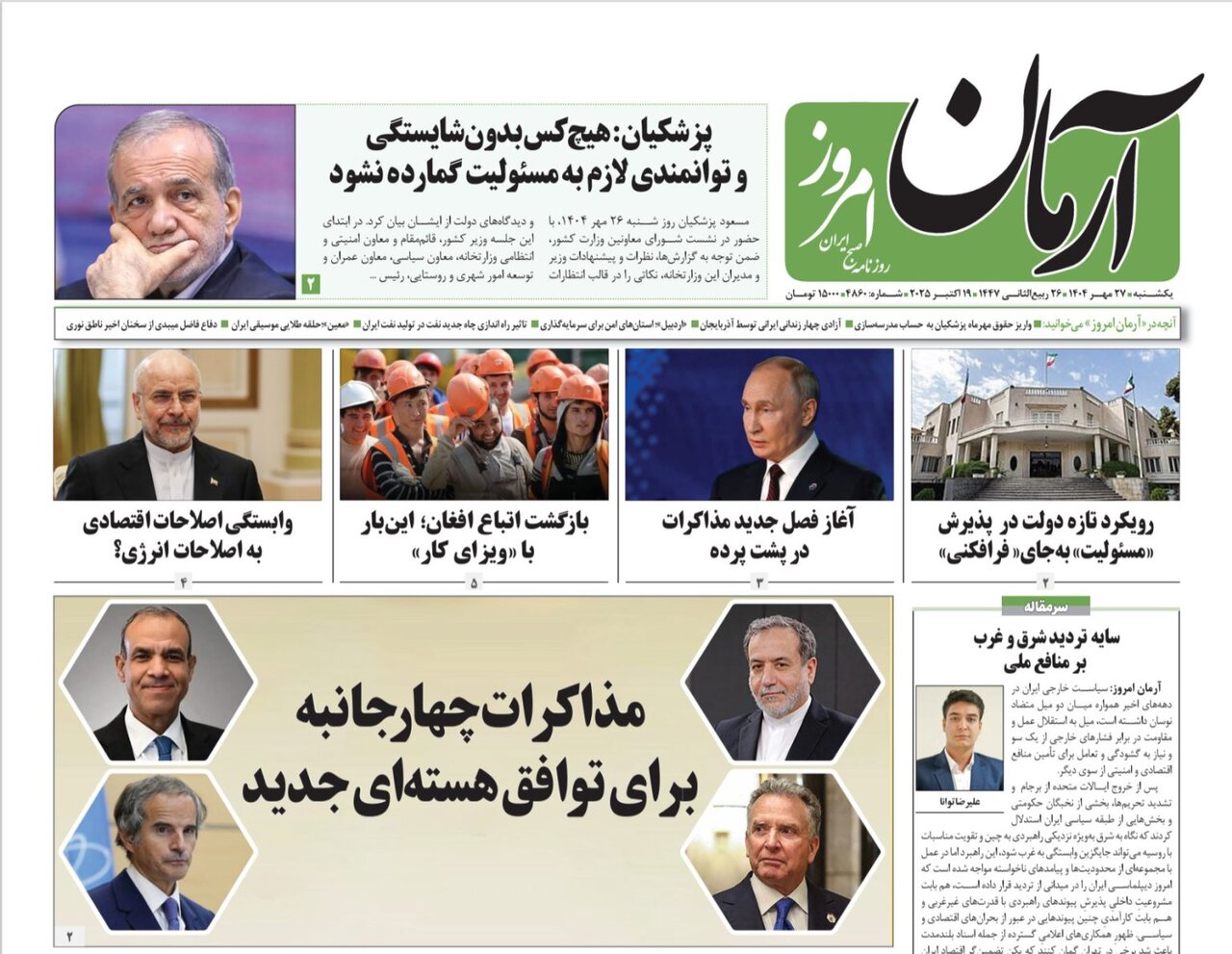Decoding Larijani's two important missions in Moscow

TEHRAN - Arman-e-Emrooz analyzed Ali Larijani’s meeting with Russian President Vladimir Putin in Moscow, saying it marked a pivotal diplomatic engagement.
The paper said: The meeting—widely covered by international media—not only conveyed a direct message from Iran’s leadership to Moscow but also marked the beginning of a new phase in strategic cooperation between the two nations. The primary objective of Larijani’s trip was to enhance and deepen military collaboration between Iran and Russia. In a region where external threats loom large, both countries—bound by shared interests—seek to fortify their defense ties. A secondary aim of the visit was to leverage Russia’s role as a mediator to facilitate dialogue between Iran and Western powers, with the broader goal of restoring lasting security to the Middle East. Amid escalating nuclear tensions and crippling sanctions that have pushed the region toward instability, Russia is positioned as a potential bridge between Tehran and Washington. More than a diplomatic meeting, this visit symbolizes the shared ambition of Iran and Russia to shape a multipolar global order. Through strengthened military cooperation, the two nations aspire to form an unyielding alliance, and with Russian mediation, they hope to usher in a new era of regional stability.
Jam-e-Jam: Benefits of Russia’s announcement of the JCPOA sunset
Jam-e-Jam praised an announcement by Moscow that has officially announced the sunset the JCPOA – the official name for the 2015 nuclear deal - and the expiry of UN Security Council Resolution 2231 that endorsed it. The newspaper wrote: Russia’s official declaration marking the sunset of the JCPOA and the expiry of United Nations Security Council Resolution 2231 offers several strategic advantages for Iran. The announcement by Russia - a key signatory to the JCPOA and the current president of the Security Council - marked a commitment to international law and a rejection of unilateral Western pressure. It not only eases Iran’s path out of prolonged limits but also elevates Moscow’s standing in global diplomatic circles. Moreover, Russia’s resolute opposition to European and American attempts to activate the snapback mechanism reinforces Iran’s image as a responsible and constructive player on the world stage. This development is expected to strengthen cooperation between Tehran and Moscow within the framework of the Comprehensive Strategic Partnership. At a time that Western powers are facing growing isolation due to the shortcomings of their own policies, Russia’s move underscores the depth of its strategic partnership with Iran. It may also serve as a springboard for expanding their influence across Eurasia and the Middle East.
Iran: Tehran and Ankara deepen cultural diplomacy
In a recent article, the Iran newspaper highlighted the three-day visit of Iran’s Minister of Culture and Islamic Guidance to Turkey, describing it as one of the most significant cultural missions in recent years. It said: the visit – took place at the official invitation of Turkey’s Minister of Culture and Tourism - was not only part of the Iran-Turkey Cultural Year 2025 initiative but also stood out for the depth of discussions, and the volume of cultural agreements signed. It marked one of the most unprecedented cultural exchanges between the two nations in over a decade. In a world full of tension, cultural diplomacy offers a quieter, more profound, and effective path toward fostering mutual understanding. If Iran and Turkey continue this trajectory with prudence and consistency, they could present a compelling model of cultural coexistence for the broader Islamic world. At a time when media narratives often distort the image of Islam, artistic and cultural collaboration can help reveal the true and humane face of Muslim societies. Initiatives such as Islamic art festivals, cultural weeks, joint film and documentary productions, and youth artist exchanges hold the potential to become enduring assets for both nations.
Javan: New sanctions are destined to fail
Javan addressed the declining influence of Western powers, particularly their efforts to reimpose sanctions on Iran. It said: the United States and European nations have attempted to recreate the global consensus that preceded the JCPOA, aiming to justify a new wave of extensive sanctions (on Iran). However, this time, their efforts appear to be facing significant resistance, as many countries are increasingly unwilling to align with Washington’s unilateral policies. The push to revive international pressure against Iran has encountered a political impasse, largely due to growing global opposition to Western unilateralism. Without broad international support, any attempt to reapply sanctions is likely to fail and will have limited impact. Over the past three years, Russia and China—working alongside developing nations through blocs like BRICS—have actively sought to challenge Western-dominated institutions and promote a new economic order. With emerging coalitions taking shape within the UN Security Council, the effectiveness of traditional Western pressure mechanisms has been significantly eroded.
Leave a Comment